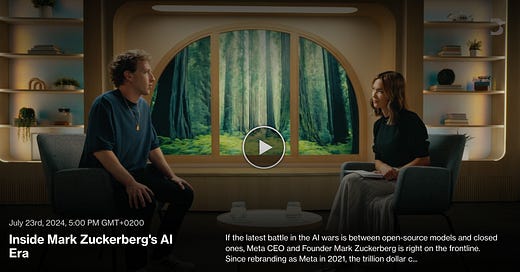Navigating Dependency: Systems, Shifts, and Agency
Learning the hard way: reflections on platforms and dependence
Reverse engineering motivations and intentions isn’t always easy. But it becomes simpler when the individual is famous and constantly interviewed. Take Mark Zuckerberg, for example. Over the past few years, he has been vocal about transforming Facebook into a Metaverse company. If you piece together his interviews, it’s clear why: Facebook isn’t a platform that can exist without others.
They don’t own a browser. They don’t control a mobile operating system. They tried, but efforts to build a phone or carve out a larger piece of the OS market fell flat. So, the logical conclusion? If they can’t be a platform in this computing era, they’ll attempt to define the next one.
Zuckerberg has talked openly about this dilemma. In interviews with The Verge and Bloomberg’s Emily Chang, he outlines the restrictions imposed by closed ecosystems, especially Apple’s iOS. His frustration is visible—he’s chasing a future where Facebook doesn’t rely on others to function.
Zuckerberg’s Strategic Shift to the Metaverse
From a strategic standpoint, it makes sense. If you have the resources, why not try to shape the next computing paradigm? It’s a bid for security, a move to ensure Facebook isn’t shackled by today’s dominant platforms.
But this isn’t an analysis of Meta’s current ambitions. (I should probably write about why Zuckerberg dresses the way he does now, but that’s for another time.) Instead, it’s a look at how far companies—and individuals—go to avoid being dependent on others.
The OpenAI Parallel: My Own Dependency
Which brings me to OpenAI and its restructuring toward a for-profit model. This isn’t Groundhog Day. It’s happening again. The news got me thinking about my own dependency. Over the past year, I’ve poured hundreds of hours into working with ChatGPT. If I count the time spent experimenting with the OpenAI API, it amounts to months of research and skill-building. I don’t regret that investment, but it’s making me question how future-proof it really is.
(As significant part of this, I’ve been quietly working with a few select small and midsize companies to explore how AI can make a meaningful impact in their operations. These companies, despite their potential, are often overlooked by large-scale AI providers. The insights I’ve gained from working with them have informed my approach to using tools like ChatGPT and shaped my understanding of the real-world challenges they face. I wrote more extensively about this in a LinkedIn post, which you can read here.)
What happens when the platform changes? How easily can I extract the value I’ve put in?
I’ve used other systems, including Claude, but over time, I gravitated back to ChatGPT. It was a conscious choice—to settle on one system for my work. But with OpenAI’s new direction, I’m at a crossroads. Nothing drastic has changed yet, but this serves as a reminder: reliance on a single platform can boost productivity but also breed vulnerability. The more asymmetry between a system and its user, the deeper that dependency becomes.
Interoperability and Cultural Shifts: The User’s Push for Freedom
We see this reflected not only in policy but in culture, too. There’s a certain vibe in today’s world—a back-and-forth between nostalgia and futurism, between irony and sincerity. It’s rooted in what people want: the freedom to move seamlessly between systems, platforms, and even identities, in a world that’s constantly shifting. This desire for agency pushes for things like interoperability, where users aren’t bound by the closed systems of the past. When the cultural vibe shifts, legislation often follows, adjusting to recognize that the boundaries keeping platforms apart no longer reflect the needs or desires of the people using them.
These examples highlight a simple truth: when users push for interoperability, industries follow. But it’s not just users driving these changes—smart legislation plays a critical role. Europe, with its Brussels effect, has shown how regulatory frameworks can reshape global markets by setting higher standards. The impact is already visible in tech regulations, and it’s clear that thoughtful legislation can align the interests of platforms and people. If the past has taught us anything, it’s that when legislation and user demand converge, we see real shifts in power dynamics. Interoperability is no different, and Europe is positioned to lead the way in ensuring these systems remain open and fair.
A Personal Shift: Exploring New Opportunities
Platform dependencies aren’t new. But the increasing gap between users and the systems they rely on is. As legislation pushes for transparency around LLMs and their providers, it’s worth thinking about interoperability. That’s where real user control will come from, ensuring some degree of freedom for those who rely on these platforms every day.
On a personal note, this piece is a reflection on a broader shift. I’ve recently left Edenspiekermann and find myself exploring new opportunities. Meanwhile, I continue to be available for trend research and strategic work—approaches you can find outlined on my website. Sometimes, shifts happen quietly, until they don’t.
Reply to this newsletter, if you want to chat.
What else is new?
Significant changes can elevate one’s ability for self-reflection. Here’s an extensive post about me leaving my previous position and how I plan to emphasize my Third Culture upbringing in both my personal and professional futures.
If you follow me on social media, you’ve probably already seen that I launched a new podcast. Follow the Rabbit explores emerging trends and cultural phenomena, and – you probably guessed it! – I host it with Johannes. We’re four episodes into our series about Third Places. New episodes and topics will be dropping weekly. Hit that subscribe button.
Drumroll, please: Since the beginning of the year, I’ve been working with Changeist on a project that allows teams to explore the futures of Artificial Intelligence in a playful way. After a few recent tests in Australia and Singapore, there’s an announcement coming soon…
It wouldn’t be me if I didn’t leave you with a gastronomic recommendation. It’s no surprise that I recommend Magic John’s. It’s the only place (at least that I know of, which says something) in Germany serving a true New York slice. They’ve been doing this since 2020, so I’m not spilling a big secret here. But after a recent trip to New York, Jonathan, the owner, came back inspired by L’Industrie Pizza. No surprises there—L’Industrie would easily make my Top 3. If you’re a regular at Magic’s, expect slightly thicker dough in your future slices. Want a sneak peek? Try the Spicy (it’s 🔥🔥🔥) Vodka slice—it’s their first attempt to move the needle.
That’s it for this one. Don’t be a stranger.







